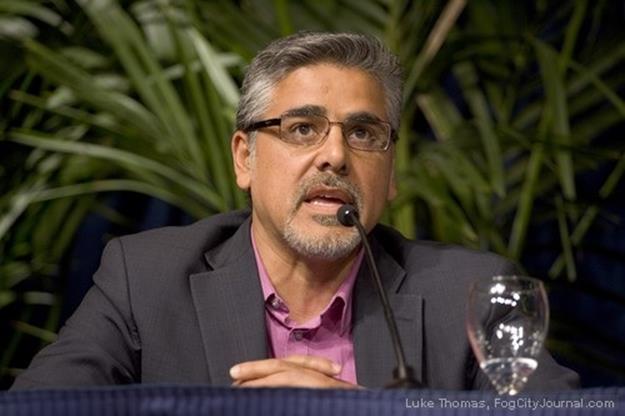
Sup. John Avalos wants San Franciscans to elect their elected officials. Photo: Luke Thomas, Fog City Journal
By Tim Redmond
MAY 20, 2014 — Sup. John Avalos today introduced a city Charter Amendment that could radically reduce the power of the mayor and change profoundly the way the city’s political allegiances work.
His measure would eliminate the ability of the mayor to fill vacancies in local elective offices by appointment and instead mandate that openings are filled by special election.
The formal title is “Democratic special elections to fill vacancies in city elective offices,” but Avalos told me he’s going call it the “Let’s Elect Our Elected Officials Act.”
There’s a certain logic to the law, particularly when it comes to the Board of Supervisors. The executive officer in American democracy doesn’t typically appoint the legislative branch. The president doesn’t fill vacancies in Congress; the governor can’t fill an empty seat in the state Legislature. Why should the mayor of San Francisco have that ability?
And it’s caused all sorts of problems and political chicanery over the years.
At one point, a majority of the members of the Board of Supervisors had been appointed by Mayor Willie Brown; he acted as if he owned them, and even at one point referred to them as “mistresses who need to be serviced.”
Often, mayors who want to make multiple appointments move politicians around to offices for which they aren’t remotely qualified. Mayor Frank Jordan wanted to put his goddaughter, Annemarie Conroy, on the Board of Supervisors, so he appointed city Assessor Richard Hongisto to the job of police chief (he lasted six weeks) then put Sup. Doris Ward, who had little financial experience, to fill the vacancy in the Assessor’s Office, creating a vacancy on the board for Conroy.
There is, of course, the serious problem of people sucking up to the mayor to vie for coveted appointments to the board or other city offices, and promising to by loyal supporters of the mayor if they get the nod. Christina Olague didn’t keep her end of the bargain, opposing Mayor Ed Lee, who had appointed her supervisor, on the Ross Mirkarimi vote; he and his allies turned against her and she was defeated at the next election.
The only possible argument against special elections is the cost: If you let the mayor fill a vacant job and wait until the next regular election, you save taxpayer money. But for supervisors, in districts, the costs are relatively modest, and even for a citywide special election for, say, city attorney, district attorney, or sheriff, the price won’t break the bank.
And it seems as if the idea will be popular: “How can anyone be in favor of back room appointments and against democracy?” Avalos asked.
It’s hard to overstate the impact this would have on the city. Mayoral power would decline significantly; backroom deals for offices would nearly vanish. Voters wouldn’t have to face complicated choices – if Sup. David Campos gets elected to the state Assembly, under the current system the mayor would appoint his successor – and it would almost certainly not be someone with similar politics.
Special elections tend to have lower turnout, and low-turnout elections tend to skew conservative – but in a race for district supervisor, a special election could favor a candidate with a good ground operation and grassroots support.
It takes the votes of six supervisors to put a Charter amendment on the ballot. You have to wonder who’s going to oppose this – and why.
Speaking of mayoral appointments, I made a mistake two weeks ago when I simply linked to a column by Samson Wong in Asian Week and presented his political prognostication as fact. That’s the danger of Internet journalism; it’s too easy to simply use links without doing the fact-checking. Nothing against Wong, but I’m told by several very reliable sources that it’s highly unlikely Victor Hwang would move to D3 to seek an appointment for supervisor if David Chiu goes to Sacramento. Much more likely the mayor would name Cindy Wu, a member of the Planning Commission who works at Chinatown Community Development Center.
Oh, and who also happens to already live in the district.
The Chiu Campos race will come down to the wire, and sadly, way too much of it has been about Ross Mirkarimi. When the real issue, which Campos has tried to talk about, is this.
If the voters decide that the Assembly race is a referendum on how San Francisco is dealing with such radical economic inequality that we’re on a par with Rwanda, then Campos wins. Even Chiu seems to realize that; his latest attack piece on Campos was all about affordable housing.






